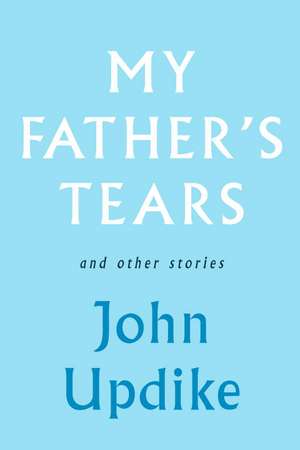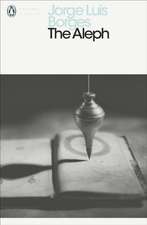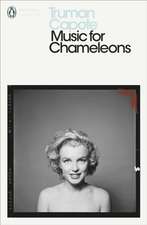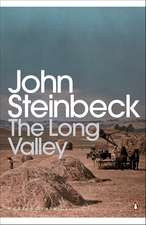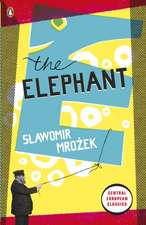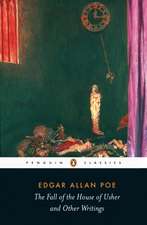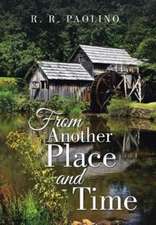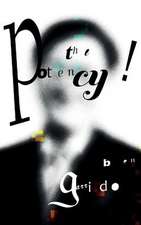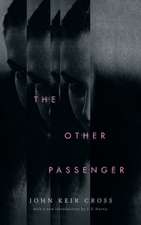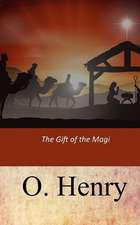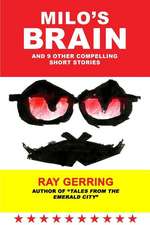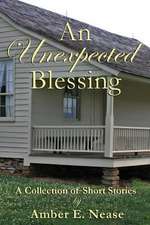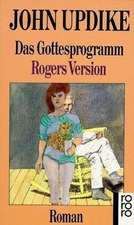My Father's Tears and Other Stories
Autor John Updikeen Limba Engleză Hardback – 31 mai 2009
“Personal Archaeology” considers life as a sequence of half-buried layers, and “The Full Glass” distills a lifetime’s happiness into one brimming moment of an old man’s bedtime routine. High-school class reunions, in “The Walk with Elizanne” and “The Road Home,” restore their hero to youth’s commonwealth where, as the narrator of the title story confides, “the self I value is stored, however infrequently I check on its condition.” Exotic locales encountered in the journeys of adulthood include Morocco, Florida, Spain, Italy, and India. The territory of childhood, with its fundamental, formative mysteries, is explored in “The Guardians,” “The Laughter of the Gods,” and “Kinderszenen.” Love’s fumblings among the bourgeoisie yield the tart comedy of “Free,” “Delicate Wives,” “The Apparition,” and “Outage.”
In sum, American experience from the Depression to the aftermath of 9/11 finds reflection in these glittering pieces of observation, remembrance, and imagination.
Preț: 144.13 lei
Nou
Puncte Express: 216
Preț estimativ în valută:
27.58€ • 29.49$ • 22.100£
27.58€ • 29.49$ • 22.100£
Carte indisponibilă temporar
Doresc să fiu notificat când acest titlu va fi disponibil:
Se trimite...
Preluare comenzi: 021 569.72.76
Specificații
ISBN-13: 9780307271563
ISBN-10: 0307271560
Pagini: 292
Dimensiuni: 142 x 204 x 29 mm
Greutate: 0.46 kg
Editura: Knopf Publishing Group
ISBN-10: 0307271560
Pagini: 292
Dimensiuni: 142 x 204 x 29 mm
Greutate: 0.46 kg
Editura: Knopf Publishing Group
Notă biografică
John Updike was born in 1932, in Shillington, Pennsylvania. He graduated from Harvard College in 1954, and spent a year in Oxford, England, at the Ruskin School of Drawing and Fine Art. From 1955 to 1957 he was a member of the staff of The New Yorker and since 1957 has lived in Massachusetts. He is the father of four children and the author of more than sixty books, including collections of short stories, poems, and criticism. His books have won the Pulitzer Prize, the National Book Award, the American Book Award, the National Book Critics Circle Award, the PEN/Faulkner Award, and the Howells Medal, among other honors. He died in January 2009.
Extras
Morocco
The seacoast road went smoothly up and down, but compared with an American highway it was eerily empty. Other cars appeared menacing on it, approaching like bullets, straddling the center strip. Along the roadside, alone in all that sunswept space, little girls in multicolored Berber costume held out bouquets of flowers—violets? poppies?—which we were afraid to stop and accept. What were we afraid of? A trap. Bandits. Undertipping, or overtipping. Not knowing enough French, and no Arabic or Berber. “Don’t stop, Daddy, don’t!” was the cry; and it was true, when we did stop at markets, interested persons out of the local landscape would gather about our rented Renault, peering in and offering unintelligible invitations.
We were an American family living in England in 1969 and had come to Morocco naïvely thinking it would be, in April, as absolute an escape to the sun as a trip to the Caribbean from the Eastern United States would be at the same time of year.
But Restinga, where a British travel agency as innocent as we of climatic realities had sent us, was deserted and windy. The hotel, freshly built by decree of the progressive, tourism-minded king, was semicircular in shape. At night, doors in the curving corridors slammed, and a solitary guard in a burnoose kept watch over the vacant rooms and the strange family of pre-season Americans. By day, the waves were too choppy to swim in, and the Mediterranean was not so much wine-dark as oil-black. Walking along the beach, we picked up tar on our feet. When we lay down on the beach, wind blew sand into our ears. Off in the distance, apartment buildings of pink concrete were slowly being assembled, and there were signs that in a month vacationers from somewhere would fill the bleak plazas, the boarded-up arcades. But for now there was only the whipping wind, a useless sun, and—singly, idly, silently in the middle distance—Arabs. Or were they Berbers? Dark men, at any rate, in robes, who frightened our baby, Genevieve. Fantastic as it seems now, when she is so tall and lovely in her spangled disco dress, she was then overweight and eight. Caleb was ten, Mark twelve, and Judith a budding fourteen.
“Je le regrette beaucoup,” I told the manager of the Restinga hotel, a blue-sweatered young man who wandered about closing doors that had blown open, “mais il faut que nous partirons. Trop de vent, et pas de bain de la mer.”
“Trop de vent,” he agreed, laughing, as if reassured that we were not as crazy as we had seemed.
“Les enfants sont malheureux, aussi ma femme. Je regrette beaucoup de partir. L’hôtel, c’est beau, en été.” I should have used the subjunctive or the future tense, and stopped trying to explain.
The manager gave our departure his stoical blessing but explained, in cascades of financial French, why he could not refund the money we had prepaid in London. So I was left with a little cash, a Hertz credit card, four children, a wife, and plane tickets that bound us to ten more days in Morocco.
We took a bus to Tangier. We stood beside an empty road at noon, six stray Americans, chunky and vulnerable in our woolly English clothes with our suitcases full of continental sun togs bought at Lilywhite’s and of Penguins for vacation reading. The sun beat upon us, and the wind. The road dissolved at either end in a pink shimmer. “I can’t believe this,” my wife said. “I could cry.”
“Don’t panic the kids,” I said. “What else can we do?” I asked. “There are no taxis. We have no money.”
“There must be something,” she said. Somehow, my mem- ory of the moment has dressed her in a highly unflattering navy-blue beret.
“I’m scared,” Genevieve announced, clutching her knapsack and looking painfully hot and rosy in her heavy gray overcoat.
“Baby,” sneered her big sister, who attracted stares from native men everywhere and was feeling a certain power.
“The bus will come,” Daddy promised, looking over their heads to the vanishing point where the road merged in the pink confusion of the new buildings the king was very slowly erecting.
A thin dark man in a dirty caftan materialized and spoke to us in a lengthy nasal language. He held out his palms as if to have them read.
“Dad, the man is talking to you,” Mark, then prepubescent and now a graduate student in computer science, said, very embarrassed.
“I know he is,” I told him, helplessly.
“What’s he saying, Dad?” Genevieve asked.
“He’s asking if this is the bus stop,” I lied.
The man, continuing to speak, came closer, confiding a breath rich in Muslim essences—native spices, tooth decay, pious fasting with its parched membranes. His remarks grew more rapid and urgent, but a light was dying in his bloodshot eyes.
“Tell him to go away.” This suggestion came from Caleb, our silent, stoic, sensible child, now a college junior majoring in zoology.
“I think he will,” I hazarded, and the man did, shaking his skeletal head at our unresponsive idiocy. Our little family clustered closer in relief. Sand blew into our shoes, and the semicircular halls of the abandoned hotel, our only home in this foreign land, howled at our backs like some deep-voiced, clumsy musical instrument.
The bus! The bus to Tangier! We waved—how we waved!—and with an incredulous toot the bus stopped. It was the green of tired grass, and chickens in slatted coops were tied to the top, along with rolled-up rugs. Inside, there were Moroccans: dusty hunched patient unknown people, wearing knit little things on their heads and knit little things on their feet, their bodies mixed in with their bundles, the women wrapped in black, some with veils, all eyes glittering upward in alarmed amazement at this onrush of large, flushed, childish Americans.
The fare, a few dirhams, was taken noncommittally by a driver, who had a Nasseresque mustache and a jaw to match. There was room at the back of the bus. As we wrestled our ponderous suitcases down the aisle, the bus swayed, and I feared we might crush with our bulky innocence this frag- ile vehicle and its delicately balanced freight. Deeper into the bus, an indigenous smell, as of burned rope, intensified.
In Tangier, the swaying bus was exchanged for a single overloaded taxi, whose driver in his desire to unload us came into the Hertz office and tried to help the negotiations along. Allah be praised, his help was not needed: the yellow plastic Hertz card that I produced did it all. Had I been able to produce also the pale green of an American Express card, our suspenseful career down the coast, from Tangier to Rabat to Casablanca and then through the narrower streets of El Jadida and Essaouira and Tafraout, would have been greatly eased, for at each hotel it was necessary to beg the clerk to accept a personal check on a London bank, and none but the most expensive hotels would risk it; hence the odd intervals of luxury that punctuated our penurious flight from the Mediterranean winds.
The avenues of Rabat as we drove into the city were festooned in red. Any thought that we were being welcomed with red banners gave way when we saw hammers and sickles and posters of Lenin. A Soviet high-level delegation, which included Kosygin and Podgorny, was being received by the versatile king, we discovered at the Rabat Hilton, which was booked so solid with Communists that it could not shelter even the most needy children of free enterprise.
But a hotel less in demand by the Soviets took us in, and at dinner, starved, we were sat down in a ring on piled carpets, around what in memory seems an immense brass tray, while a laughing barefoot girl tiptoed at our backs, sprinkling rosewater into our hair. Mark, tickled, made his monkey face.
This sensation of being beautifully served amid undercurrents of amusement recurred in a meadow high above the sea, where, after miles of empty landscape and empty stomachs, a minuscule restaurant, scarcely more than a lean-to, advertised itself with a wooden arrow. We stopped the rented Renault and with trepidation walked across the grass, single-file, feeling again huge, as when we trod deeper into that fragrant bus. We halted when a man emerged from the shack bearing a table, and a boy emerged carrying chairs. With an air of amusement all around, this furniture was set on the grassy earth, in a spot we lightly indicated. From the shed were produced in time wine, rice, kebabs, and Cokes, which we consumed in sight of the Atlantic, of beige cliffs, and of vast pastures grazed by a single donkey—the only customers, for all we knew, that this beautiful restaurant by the sea had ever had.
Even on the rough back road to Tafraout, into the stony hills of the Low Atlas, with the gas gauge saying zero and not a house, not a sheep or goat, in sight, a little girl in a dip of the unpaved track held out a handful of flowers. The road here had become one with the rocks of a dry riverbed, so our Renault was moving slowly, so slowly she had time, when she saw we were truly not going to stop, to whip our fenders with the flowers and to throw them at the open car window. One or two fell inside, onto our laps. The rest fell onto the asphalt beside her feet. In the rearview mirror I saw the little girl stamp her foot in rage. Perhaps she cried. She was about the age of Genevieve, who expressed empathy and sadness as the girl diminished behind us and dropped from sight.
The seacoast road went smoothly up and down, but compared with an American highway it was eerily empty. Other cars appeared menacing on it, approaching like bullets, straddling the center strip. Along the roadside, alone in all that sunswept space, little girls in multicolored Berber costume held out bouquets of flowers—violets? poppies?—which we were afraid to stop and accept. What were we afraid of? A trap. Bandits. Undertipping, or overtipping. Not knowing enough French, and no Arabic or Berber. “Don’t stop, Daddy, don’t!” was the cry; and it was true, when we did stop at markets, interested persons out of the local landscape would gather about our rented Renault, peering in and offering unintelligible invitations.
We were an American family living in England in 1969 and had come to Morocco naïvely thinking it would be, in April, as absolute an escape to the sun as a trip to the Caribbean from the Eastern United States would be at the same time of year.
But Restinga, where a British travel agency as innocent as we of climatic realities had sent us, was deserted and windy. The hotel, freshly built by decree of the progressive, tourism-minded king, was semicircular in shape. At night, doors in the curving corridors slammed, and a solitary guard in a burnoose kept watch over the vacant rooms and the strange family of pre-season Americans. By day, the waves were too choppy to swim in, and the Mediterranean was not so much wine-dark as oil-black. Walking along the beach, we picked up tar on our feet. When we lay down on the beach, wind blew sand into our ears. Off in the distance, apartment buildings of pink concrete were slowly being assembled, and there were signs that in a month vacationers from somewhere would fill the bleak plazas, the boarded-up arcades. But for now there was only the whipping wind, a useless sun, and—singly, idly, silently in the middle distance—Arabs. Or were they Berbers? Dark men, at any rate, in robes, who frightened our baby, Genevieve. Fantastic as it seems now, when she is so tall and lovely in her spangled disco dress, she was then overweight and eight. Caleb was ten, Mark twelve, and Judith a budding fourteen.
“Je le regrette beaucoup,” I told the manager of the Restinga hotel, a blue-sweatered young man who wandered about closing doors that had blown open, “mais il faut que nous partirons. Trop de vent, et pas de bain de la mer.”
“Trop de vent,” he agreed, laughing, as if reassured that we were not as crazy as we had seemed.
“Les enfants sont malheureux, aussi ma femme. Je regrette beaucoup de partir. L’hôtel, c’est beau, en été.” I should have used the subjunctive or the future tense, and stopped trying to explain.
The manager gave our departure his stoical blessing but explained, in cascades of financial French, why he could not refund the money we had prepaid in London. So I was left with a little cash, a Hertz credit card, four children, a wife, and plane tickets that bound us to ten more days in Morocco.
We took a bus to Tangier. We stood beside an empty road at noon, six stray Americans, chunky and vulnerable in our woolly English clothes with our suitcases full of continental sun togs bought at Lilywhite’s and of Penguins for vacation reading. The sun beat upon us, and the wind. The road dissolved at either end in a pink shimmer. “I can’t believe this,” my wife said. “I could cry.”
“Don’t panic the kids,” I said. “What else can we do?” I asked. “There are no taxis. We have no money.”
“There must be something,” she said. Somehow, my mem- ory of the moment has dressed her in a highly unflattering navy-blue beret.
“I’m scared,” Genevieve announced, clutching her knapsack and looking painfully hot and rosy in her heavy gray overcoat.
“Baby,” sneered her big sister, who attracted stares from native men everywhere and was feeling a certain power.
“The bus will come,” Daddy promised, looking over their heads to the vanishing point where the road merged in the pink confusion of the new buildings the king was very slowly erecting.
A thin dark man in a dirty caftan materialized and spoke to us in a lengthy nasal language. He held out his palms as if to have them read.
“Dad, the man is talking to you,” Mark, then prepubescent and now a graduate student in computer science, said, very embarrassed.
“I know he is,” I told him, helplessly.
“What’s he saying, Dad?” Genevieve asked.
“He’s asking if this is the bus stop,” I lied.
The man, continuing to speak, came closer, confiding a breath rich in Muslim essences—native spices, tooth decay, pious fasting with its parched membranes. His remarks grew more rapid and urgent, but a light was dying in his bloodshot eyes.
“Tell him to go away.” This suggestion came from Caleb, our silent, stoic, sensible child, now a college junior majoring in zoology.
“I think he will,” I hazarded, and the man did, shaking his skeletal head at our unresponsive idiocy. Our little family clustered closer in relief. Sand blew into our shoes, and the semicircular halls of the abandoned hotel, our only home in this foreign land, howled at our backs like some deep-voiced, clumsy musical instrument.
The bus! The bus to Tangier! We waved—how we waved!—and with an incredulous toot the bus stopped. It was the green of tired grass, and chickens in slatted coops were tied to the top, along with rolled-up rugs. Inside, there were Moroccans: dusty hunched patient unknown people, wearing knit little things on their heads and knit little things on their feet, their bodies mixed in with their bundles, the women wrapped in black, some with veils, all eyes glittering upward in alarmed amazement at this onrush of large, flushed, childish Americans.
The fare, a few dirhams, was taken noncommittally by a driver, who had a Nasseresque mustache and a jaw to match. There was room at the back of the bus. As we wrestled our ponderous suitcases down the aisle, the bus swayed, and I feared we might crush with our bulky innocence this frag- ile vehicle and its delicately balanced freight. Deeper into the bus, an indigenous smell, as of burned rope, intensified.
In Tangier, the swaying bus was exchanged for a single overloaded taxi, whose driver in his desire to unload us came into the Hertz office and tried to help the negotiations along. Allah be praised, his help was not needed: the yellow plastic Hertz card that I produced did it all. Had I been able to produce also the pale green of an American Express card, our suspenseful career down the coast, from Tangier to Rabat to Casablanca and then through the narrower streets of El Jadida and Essaouira and Tafraout, would have been greatly eased, for at each hotel it was necessary to beg the clerk to accept a personal check on a London bank, and none but the most expensive hotels would risk it; hence the odd intervals of luxury that punctuated our penurious flight from the Mediterranean winds.
The avenues of Rabat as we drove into the city were festooned in red. Any thought that we were being welcomed with red banners gave way when we saw hammers and sickles and posters of Lenin. A Soviet high-level delegation, which included Kosygin and Podgorny, was being received by the versatile king, we discovered at the Rabat Hilton, which was booked so solid with Communists that it could not shelter even the most needy children of free enterprise.
But a hotel less in demand by the Soviets took us in, and at dinner, starved, we were sat down in a ring on piled carpets, around what in memory seems an immense brass tray, while a laughing barefoot girl tiptoed at our backs, sprinkling rosewater into our hair. Mark, tickled, made his monkey face.
This sensation of being beautifully served amid undercurrents of amusement recurred in a meadow high above the sea, where, after miles of empty landscape and empty stomachs, a minuscule restaurant, scarcely more than a lean-to, advertised itself with a wooden arrow. We stopped the rented Renault and with trepidation walked across the grass, single-file, feeling again huge, as when we trod deeper into that fragrant bus. We halted when a man emerged from the shack bearing a table, and a boy emerged carrying chairs. With an air of amusement all around, this furniture was set on the grassy earth, in a spot we lightly indicated. From the shed were produced in time wine, rice, kebabs, and Cokes, which we consumed in sight of the Atlantic, of beige cliffs, and of vast pastures grazed by a single donkey—the only customers, for all we knew, that this beautiful restaurant by the sea had ever had.
Even on the rough back road to Tafraout, into the stony hills of the Low Atlas, with the gas gauge saying zero and not a house, not a sheep or goat, in sight, a little girl in a dip of the unpaved track held out a handful of flowers. The road here had become one with the rocks of a dry riverbed, so our Renault was moving slowly, so slowly she had time, when she saw we were truly not going to stop, to whip our fenders with the flowers and to throw them at the open car window. One or two fell inside, onto our laps. The rest fell onto the asphalt beside her feet. In the rearview mirror I saw the little girl stamp her foot in rage. Perhaps she cried. She was about the age of Genevieve, who expressed empathy and sadness as the girl diminished behind us and dropped from sight.
Cuprins
Morocco
Personal Archaeology
Free
The Walk with Elizanne
The Guardians
The Laughter of the Gods
Varieties of Religious Experience
Spanish Prelude to a Second Marriage
Delicate Wives
The Accelerating Expansion of the Universe
German Lessons
The Road Home
My Father’s Tears
Kinderszenen
The Apparition
Blue Light
Outage
The Full Glass
Personal Archaeology
Free
The Walk with Elizanne
The Guardians
The Laughter of the Gods
Varieties of Religious Experience
Spanish Prelude to a Second Marriage
Delicate Wives
The Accelerating Expansion of the Universe
German Lessons
The Road Home
My Father’s Tears
Kinderszenen
The Apparition
Blue Light
Outage
The Full Glass
Descriere
Updike's first collection of new short fiction since the year 2000, "My Father's Tears" finds the author in a valedictory mood as he mingles narratives of his native Pennsylvania with stories of New England suburbia and of foreign travel.
